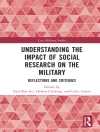This book examines new and challenging political aspects of cyber security and presents it as an issue defined by socio-technological uncertainty and political fragmentation.Structured along two broad themes and providing empirical examples for how socio-technical changes and political responses interact, the first part of the book looks at the current use of cyber space in conflictual settings, while the second focuses on political responses by state and non-state actors in an environment defined by uncertainties. Within this, it highlights four key debates that encapsulate the complexities and paradoxes of cyber security politics from a Western perspective – how much political influence states can achieve via cyber operations and what context factors condition the (limited) strategic utility of such operations; the role of emerging digital technologies and how the dynamics of the tech innovation process reinforce the fragmentation of the governance space; how states attempt to uphold stability in cyberspace and, more generally, in their strategic relations; and how the shared responsibility of state, economy, and society for cyber security continues to be re-negotiated in an increasingly trans-sectoral and transnational governance space.This book will be of much interest to students of cyber security, global governance, technology studies, and international relations.The Open Access version of this book, available at www.taylorfrancis.com, has been made available under a Creative Commons Attribution-Non Commercial-No Derivatives 4.0 license.
Myriam Dunn Cavelty & Andreas Wenger
Cyber Security Politics [EPUB ebook]
Socio-Technological Transformations and Political Fragmentation
Cyber Security Politics [EPUB ebook]
Socio-Technological Transformations and Political Fragmentation
购买此电子书可免费获赠一本!
语言 英语 ● 格式 EPUB ● 网页 286 ● ISBN 9781000567137 ● 编辑 Myriam Dunn Cavelty & Andreas Wenger ● 出版者 Taylor and Francis ● 发布时间 2022 ● 下载 3 时 ● 货币 EUR ● ID 8290226 ● 复制保护 Adobe DRM
需要具备DRM功能的电子书阅读器












